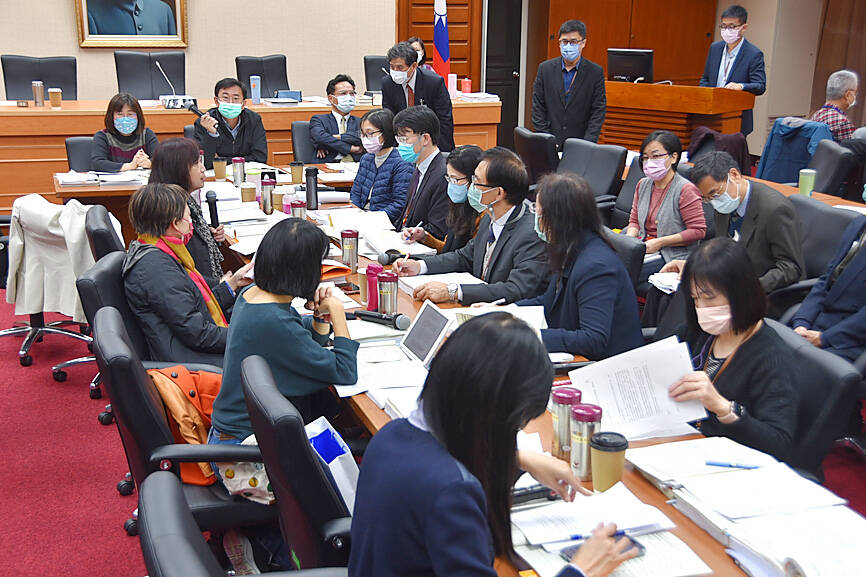A small part of the Atomic Energy Council’s (AEC) budget yesterday was frozen by the legislature’s Education and Culture Committee after an investigation was launched over alleged harassment and bullying of council workers by AEC Minister Hsieh Shou-shing (謝曉星).
The committee froze NT$10 million (US$326,990) in administrative funding, as well as Hsieh’s special allowance of NT$477,000.
The committee reached the decision during a review of the council’s budget for the next fiscal year.

Photo: Wu Po-hsuan, Taipei Times
The council is not allowed to access the funds until it submits a written report to the Legislative Yuan and briefs the committee on how it has handled complaints of sexual harassment filed by council employees, a process that must wait until the next legislative session in February.
AEC Deputy Minister Chang Ching-wen (張靜文) attended the committee meeting.
Hsieh is on leave until the investigation is completed.
Chinese Nationalist Party (KMT) Legislator Wan Mei-ling (萬美玲) said the council every year budgets funding for its gender equality committee, which is in charge of employee training.
However, the Hsieh situation shows that the council has failed to thoroughly enforce the government’s gender policies, Wan said.
“The budget for the council minister’s special allowance should be completely eliminated,” she said.
New Power Party Legislator Claire Wang (王婉諭) said that Hsieh did not voluntarily recuse himself from the internal investigation.
In addition to Hsieh’s allowance, some administrative funding should be frozen to push the council to change its gender equality policy, Wang said.
“All AEC employees should work hard to achieve gender equality in the workplace,” she said. “The frozen funds are only about one-35th of the council’s total administrative funding and would not disrupt its operations.”
Democratic Progressive Party (DPP) Legislator Ho Hsin-chun (林欣純) said that the government would have no grounds to ask the private sector to adhere to gender equality policies if it has trouble setting an example itself.
DPP Legislator Lai Pin-yu (賴品妤) said that the council has failed the Executive Yuan’s gender equality evaluation annually since 2015, adding that more administrative funding should be frozen to prompt a comprehensive change to its handling of gender equality issues.
AEC Personnel Office Director Lin Ching-wen (林靜玟) told lawmakers that the council’s system of accepting sexual harassment complaints has loopholes.
“We are revising our guidelines for handling sexual harassment complaints and will retain external experts to examine them,” Lin said. “All high-ranking officials within the council will be obligated to undergo training next year.”

Several Chinese Nationalist Party (KMT) officials including Chairman Eric Chu (朱立倫) are to be summoned for questioning and then transferred to prosecutors for holding an illegal assembly in Taipei last night, the Taipei Police said today. Chu and two others hosted an illegal assembly and are to be requested to explain their actions, the Taipei City Police Department's Zhongzheng (中正) First Precinct said, referring to a protest held after Huang Lu Chin-ju (黃呂錦茹), KMT Taipei's chapter director, and several other KMT staffers were questioned for alleged signature forgery in recall petitions against Democratic Progressive Party (DPP) legislators. Taipei prosecutors had filed

Taiwan would welcome the return of Honduras as a diplomatic ally if its next president decides to make such a move, Minister of Foreign Affairs Lin Chia-lung (林佳龍) said yesterday. “Of course, we would welcome Honduras if they want to restore diplomatic ties with Taiwan after their elections,” Lin said at a meeting of the legislature’s Foreign Affairs and National Defense Committee, when asked to comment on statements made by two of the three Honduran presidential candidates during the presidential campaign in the Central American country. Taiwan is paying close attention to the region as a whole in the wake of a

NEW WORLD: Taiwan is pursuing innovative approaches to international relations through economics, trade and values-based diplomacy, the foreign minister said Taiwan would implement a “three-chain strategy” that promotes democratic values in response to US tariffs, Minister of Foreign Affairs Lin Chia-lung (林佳龍) said. Taiwan would aim to create a “global democratic value chain,” seek to capitalize on its position within the first island chain and promote a “non-red supply chain,” Lin was quoted as saying in the ministry’s written report to the Legislative Yuan submitted ahead of the legislature’s Foreign Affairs and National Defense Committee meeting slated for today. The Ministry would also uphold a spirit of mutual beneficial collaboration, maintaining close communication and consultations with Washington to show that Taiwan-US cooperation

Taiwan and the US have begun trade negotiations over tariffs imposed by US President Donald Trump earlier this month, Minister of Foreign Affairs Lin Chia-lung (林佳龍) said in an interview this morning before reporting to the Legislative Yuan’s Foreign Affairs and National Defense Committee. The Taipei Economic and Cultural Representative Office (TECRO), Taiwan’s de facto embassy in the US, has already established communication channels with the US Department of State and the US Trade Representative (USTR), and is engaging in intensive consultations, he said. Points of negotiation include tariffs, non-tariff trade barriers and issues related to investment, procurement and export controls, he